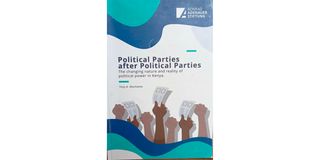'Parte after parte': Sad story of Kenya's political parties

The cover of ‘Political Parties after Political Parties’.
What you need to know:
- Book Title: Political Parties After Political Parties: The Changing Nature and Reality of Political Power in Kenya
- Author: Tony A. Mochama
- Publisher: Konrad Adenauer Stiftung
- Year of publication: 2021
- Reviewed by: Faith Oneya
'Bursting with rhyme and reason’ is one way to describe Tony Mochama’s Political Parties After Political Parties: The Changing Nature and Reality of Political Power in Kenya. Better known for his works of fiction and poetry, the senior journalist, columnist and creative writer has taken on a topic that Kenyans are known to be extremely fond of: politics.
The rhyme is evident throughout the book, right from the titles, like chapter seven which reads ‘There’s Always Defiance with Rainbow Alliance’ to the phrases within the chapters. You can easily tell that you are in the company of a poet.
One knows they are in for some of the very Mochama-esque sense of humour as soon as they read the book’s dedication to his mentor, Prof Mikhail Lossel, who “...in a burst of ‘high spirited’ goodwill, bought Raila Odinga a 50,000 Kenya shilling bottle of champagne at Safari Club, in the December of 2001”.
If you have read Princess Adhis and the Naija Coca Broda by the author, then you need no introduction to his brand of humour.
It wouldn’t be surprising if the book’s title was fashioned from ‘Parte After Parte’, a club banger by popular Ugandan singer Bigtril. Especially since one of the author’s books, A Night Guide through the City-in-the-Sun, suggests that he has a pretty good grasp of what Nairobi nights sound like.
Trapped in history
For lovers of history, the stories in Political Parties After Political Parties will be very familiar. James Baldwin once said that people are trapped in history, and history is trapped in them. The book is a stark reminder of this.
The beauty of Political Parties After Political Parties, though, lies in the dexterity with which the author connects the dots between the past and the present, often making attempts of predicting what the future could look like. He also draws parallels with global politics, spicing up the book with a generous serving of world history.
The author unpacks the intrigues behind every political party, right from the Kanu, founded “on a cold Saturday of May 1960 in Kiambu” to Jubilee Party of Kenya (founded in 2016). This phrase from the book aptly sums up the ‘Party After Party’ story: “…political parties in Kenya are paper tiger; to be muffled, saddled and rode on at will by politicians to whatever and wherever they may deem fit, then gotten rid of if necessary, by the riders.”
It would be best to brace yourself for even more colourful descriptions as you dig into the book.
The author seamlessly traverses through the political parties’ “manifestos”, poking holes where he can - and where the stories have holes begging to be poked - and filling gaps with both hard facts and his own quirky albeit well-grounded perspectives at each turn.
From ‘Fuata Nyayo’ to the ‘Tyranny of Numbers’, to ‘Wakiapisha Tunaapisha’ (If they swear in, we swear in) to the ‘Handshake’, the author leaves nothing to chance. There are no political “untouchables” in this book. In the author’s eyes, all politicians are fair game.
Literary gangster
Political Parties After Political Parties is not your traditional book. If it was, the author would have truly veered off his ‘Literary Gangster’ brand authenticity. He has a poetry collection titled What If I’m a Literary Gangster? which showed the literary world precisely what he thought of stuffy rules.
The author is not fixated on one voice or style. He breaks grammar rules where necessary, and if something needs to be said in Kiswahili or sheng, he says it.
Irreparable pieces
His avant-garde style in book-writing is evident in chapter eight, for example, titled: ‘Constitutional Oranges as things go Bananas’. This chapter is penned by Khainga O’Okwemba, the PEN President (Kenya) and a senior journalist. In his characteristic writing style, O’Okwemba gives a solid, measured account of what transpired after President Kibaki was sworn in and the cracks in the Memorandum of Understanding - remember the nusu mkate debacle? O’Okwemba also interviews Bobby Mkangi, a commissioner on the Committee of Experts that delivered the 2010 Constitution.
Some of the book’s chapters feature columns from political writers from the Standard and Nation newspapers, which helps offer a 360-degree analysis of the ‘Party after Party’ situation.
But it’s in chapter nine that Mochama pulls out the big guns in storytelling in a journal-entries writing style. Un-encumbered with too many other people’s stories and focusing on his own, and with the creative license to bend language in whatever ways he pleases to drive his points home. He takes us through post-election violence through his eyes as a Kenyan man, journalist, father, brother and friend.
His entry on January 18, 2008 reads that Kenya is “still crashing through the air, waiting to hit the ground and completely break up into irreparable pieces”. Indeed, Kenya’s still as broken in 2021 as it was 13 years ago. As he rightly puts it, Mochama’s story is as personal as it’s national.
At the risk of sounding cliché, the book serves as a necessary and timely aide-mémoire that it will always be the same forest, different monkeys when it comes to political power in Kenya.





